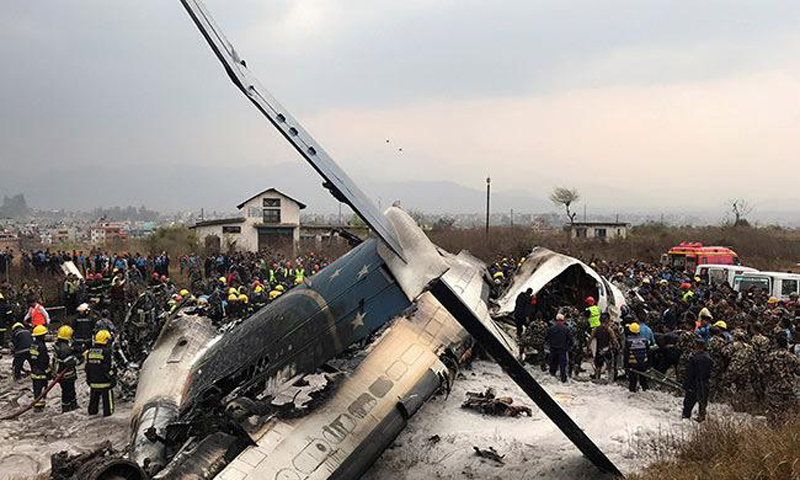Pilot of the US-Bangla plane was mentally stressed : Nepali report

An investigation into a deadly plane crash at Nepal's international airport has blamed the captain who wept and suffered an emotional breakdown during the flight after his skills had been questioned, according to a draft of the report leaked on Monday.
The March 12 flight from the Bangladeshi capital Dhaka crash-landed at Kathmandu airport and skidded into a football field where it burst into flames, killing 51 people in the deadliest aviation accident in the Himalayan nation for decades.
সম্পর্কিত খবর
Captain Abid Sultan of US-Bangla Flight BS211 that crashed at Kathmandu’s Tribhuvan International Airport in March killing 51 people, appears to have ‘lied’ to the control tower during the landing procedure and was smoking continuously inside the cockpit during the one-hour flight from Dhaka to Kathmandu, said the report, a copy of which was obtained by the Kathmandu Post.
Captain Abid Sultan, the pilot of the US-Bangla plane that crashed at Kathmandu’s Tribhuvan International Airport in March killing 51 people
Throughout the flight, Sultan was engaged in ‘erratic behaviour’ that marked a departure from his usual character-signs that should have immediately raised red flags, Nepali investigators concluded in the report.
Six minutes before the landing time, Sultan had confirmed that the plane’s landing gear was down and locked. “Gears down, three greens,” the pilot said, according to the report, referring to the electrical indicator lights inside the cockpit.
However, when co-pilot Prithula Rashid conducted a final landing checklist, the landing gears were not down. Minutes later, the plane carrying 67 passengers and four crew members burst into flames after missing the runway during its second landing attempt.
The majority of the 22 Nepalis killed in the crash were medical students who had come home on a two-month leave before their final year results were published. Only 20 passengers survived the crash.
Investigators say Sultan had been ‘smoking cigarettes frequently’ during the hour-long flight from Dhaka to Kathmandu.
The former Bangladeshi Air Force pilot, who had clocked more than 5,500 flying hours, had not disclosed to the airlines that he was a smoker, leading investigators to conclude that Sultan was undergoing severe mental stress inside the cockpit.
“When we analysed the conversation on the Cockpit Voice Recorder, it was clear to us that the captain was harbouring severe mental stress. He also seemed to be fatigued and tired due to lack of sleep,” investigators wrote in the report. “He was crying on several occasions.”
The voice recorder has captured nearly an hour-long conversation between the captain and his co-pilot in the cockpit, further demonstrating Sultan’s ‘tensed mood’ throughout the flight and a ‘complete lack of situational awareness’, according to the report.
It was not clear whom the pilot was directing the statement at, as the co-pilot was the only crew member present inside the cockpit during the flight.
The report also shows that Sultan made multiple abusive statements toward a female colleague [another co-pilot in the company] who had questioned his reputation as an instructor, and their relationship was a major topic of discussion throughout the flight. Records show that Rashid, the co-pilot, was a passive listener to Sultan’s story throughout the flight.
“A cockpit is a place where personal conversations between colleagues are strictly prohibited when the aircraft is preparing to land or take off,” said Captain Shrawan Rijal of Nepal Airlines. “It’s a strictly enforced cockpit rule, which instructs pilots to focus entirely on the aircraft’s operations.”
At one point during the flight, according to details from the audio recorder, the pilot broke down and said that he was “very upset and hurt by the behaviour of the female colleague” and that “she was the only reason he was leaving the company.”
The captain had expressed his desire to resign a day before the accident, the report says, although he had not submitted any written documents. He said that he wished to continue on the job for three more months to complete training the co-pilots.
Sultan had joined US-Bangla in 2015. Prior to flying commercial flights, he had served in the Bangladesh Air Force, and according to reports, had a history of depression. While in the Bangladesh Air Force, back in 1993, he had been removed from active duty after a psychiatric assessment. But he was re-evaluated by a psychiatrist back on January 9, 2002, and had been declared fit for flying.
The report said that Sultan’s detail medical history was not reviewed by US-Bangla Airlines when he was hired.
Kamrul Islam, general manager and spokesperson for the US-Bangla Airlines, declined the Post’s request for comment.
According to the report, Sultan then lit a cigarette, when the aircraft had just under three minutes to start their initial approach. This, the report says, demonstrated complacency and gross negligence of procedural discipline on the pilot’s part.

